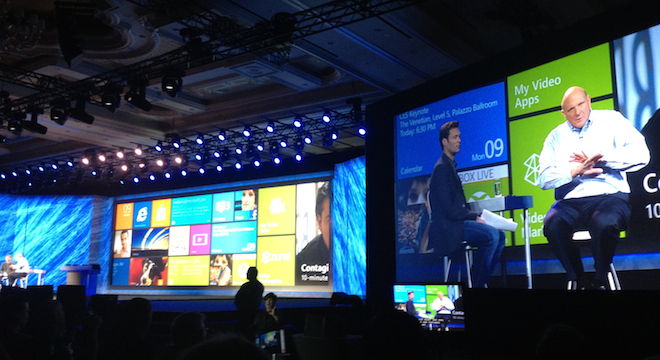LAS VEGAS — Microsoft CEO Steve Ballmer gave what the company has said will be its final keynote speech at the Consumer Electronics Show on Monday night. And much like the T.S. Eliot poem, it ended not with a bang, but a whimper.
Ballmer, with the aid of Ryan Seacrest, showed off the new Windows 8 operating system, which Microsoft hopes will make a big splash when it launches for public beta in February.
“The feature attraction of tonight’s keynote is Metro Style,” Ballmer told Seacrest, referring to the Windows 8 user interface — a new look for Windows which incorporates the innovative “tiles” navigational system pioneered on Microsoft’s Windows Phone 7.
Other Microsoft executives also demoed voice-controlled Bing search for XBox’s home entertainment offerings, an interactive version of Sesame Street for the XBox Kinect, and various features of the Metro user interface on Windows Phones, all of which are set to come out later in 2012.
But no news of much real consequence or substance came from the event, much to the disappointment of the thousands of reporters, analysts and exhibitors who showed up to see the colorful, frequently profane, notoriously high-strung Ballmer take the stage for what is supposedly the last time here at CES in Vegas.
Microsoft has headlined CES every year for the past 14 years, but in late December 2011, just a few weeks ahead of the show, the company announced that CES 2012 would be its final keynote address.
“We won’t have a keynote or booth after this year because our product news milestones generally don’t align with the show’s January timing,” wrote Frank Shaw, Microsoft’s communications chief, in a blog post at the time.
Indeed, most of the products unveiled had already been shown off or explained by Microsoft in greater detail earlier in 2011.
There was some advance warning that this would be the case from Ina Fried at All Things D, who wrote that “there probably won’t be much new from what the company showed developers last fall at its Build conference,” in a piece published just as the keynote started.
Following along on Twitter, it was clear very early on that tech writers didn’t have much patience for Microsoft’s recycled Windows 7 statistics and advertisements for Windows 7 PCs, both of which played parts in the keynote.
But the keynote seemed to have jumped the shark for good when a good-natured attempt at levity — a “Tweet Choir” — was brought onstage to literally sing a Gospel-style rendition of all the public tweets about Microsoft’s keynote.
“Microsoft has hired a choir to sing the tweets focused on the keynote. It is surreal. #CES,” Wired tweeted.
“We’re all clapping in The Verge trailer. Clapping that it has FINISHED,” tweeted Tom Warren, senior news editor at The Verge.
The initial reviews by international media outlets were even less kind.
“Microsoft CEO Steve Ballmer has flopped his final keynote at the Consumer Electronics Show in Las Vegas, presenting a bizarre display that was hosted by US entertainment personality Ryan Seacrest and included a ‘tweet choir’, but virtually no new significant announcements,” wrote Asher Moses for the Sydney Morning Herald in a piece headlined: “Microsoft CEO crashes and burns in final CES keynote.”
Clearly, however, expectations for Microsoft’s final keynote were a bit outsized, with some even suggesting that Microsoft co-founder, former CEO and CES mainstay Bill Gates might make an appearance. A flashback video showing clips of various appearances by Gates at the conference even stirred some false hope among observers, but to no avail.
Still, there’s a good case to be made that the uncharitable reception and bloated expectations overlook some significant advancements that Microsoft will be bringing to consumers in 2012, from a Kinect for Windows to the new Windows App Store, the latter of which will be launching in every nation in which Windows is currently available (over 200) in February.
XBox, too, inked several important content deals that were mentioned at the show — a deal to offer Comcast’s Xfinity streaming service and a deal with News Corporation to offer Fox News and The Wall Street Journal apps on the system, all of which are due later in 2012.
Even Microsoft’s voice-controlled Bing search for XBox was impressively responsive and quick, pulling up content based not only on intuitive categorical keywords — games, movies, etc — but also based on a single actor (“Josh Duhamel” was the example given).
Yet with Microsoft showing off a talk-to-type feature on Windows 8 and rolling out its “I’m a PC” slogan again for a video of currently available Windows 7 laptops, there was no mistaking the shadow of Apple looming over the proceedings.
That’s a shame for Windows fans and electronics customers in general, as Windows 8 and Windows Phone, from what many who have tested them have said, are actually great products that deserve to be evaluated on their own terms.
It’s also a shame for the Consumer Electronics Association, the industry assocation that hosts CES. Steve Koenig, the organization’s CEO, kicked off the final Ballmer keynote talking up Microsoft’s contributions to CES over the years and presenting Ballmer with a collage of previous keynotes. At one point, Koenig even compared Microsoft executives to America’s Founding Fathers, at least in terms of their impact on the technology industry.
And yet, Microsoft’s keynote was anything but a revolutionary event. As Frederic Lardinois of Silicon Filter wrote:
In some way, the keynote felt like a huge middle finger to CES. It’s almost as if Microsoft, which had already said that CES didn’t quite fit into its rhythm of announcement anymore, wanted to drive this point home by announcing close to nothing.
But with such a lackluster, even disheartening keynote, Microsoft surely isn’t doing itself any favors going into the new year. Either way, We’ll know more come February. Stay tuned.









